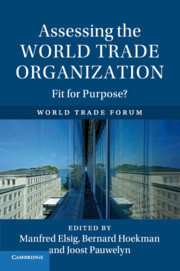Book contents
- Assessing the World Trade Organization: Fit for Purpose?
- Assessing the World Trade Organization
- Copyright page
- Contents
- Figures
- Tables
- Contributors
- Preface
- Abbreviations
- Part I Introduction and Setting the Stage
- Part II New Insight from the Early Times
- Part III General Trends and Patterns in WTO Dispute Settlement
- Part IV Zooming in on Specific Debates
- Part V Interactions Within and Across Regimes
- 12 The Presence of the World Trade Organization Within Preferential Trade Agreements
- 13 The WTO and Regional Trading Agreements
- 14 Performance and International Organisations’ Borders
- 15 The GATT/WTO System and National Trade Policies
- Index
- References
14 - Performance and International Organisations’ Borders
The Case of the World Trade Organization
from Part V - Interactions Within and Across Regimes
Published online by Cambridge University Press: 19 May 2017
- Assessing the World Trade Organization: Fit for Purpose?
- Assessing the World Trade Organization
- Copyright page
- Contents
- Figures
- Tables
- Contributors
- Preface
- Abbreviations
- Part I Introduction and Setting the Stage
- Part II New Insight from the Early Times
- Part III General Trends and Patterns in WTO Dispute Settlement
- Part IV Zooming in on Specific Debates
- Part V Interactions Within and Across Regimes
- 12 The Presence of the World Trade Organization Within Preferential Trade Agreements
- 13 The WTO and Regional Trading Agreements
- 14 Performance and International Organisations’ Borders
- 15 The GATT/WTO System and National Trade Policies
- Index
- References
- Type
- Chapter
- Information
- Assessing the World Trade OrganizationFit for Purpose?, pp. 376 - 403Publisher: Cambridge University PressPrint publication year: 2017
References
- 1
- Cited by



